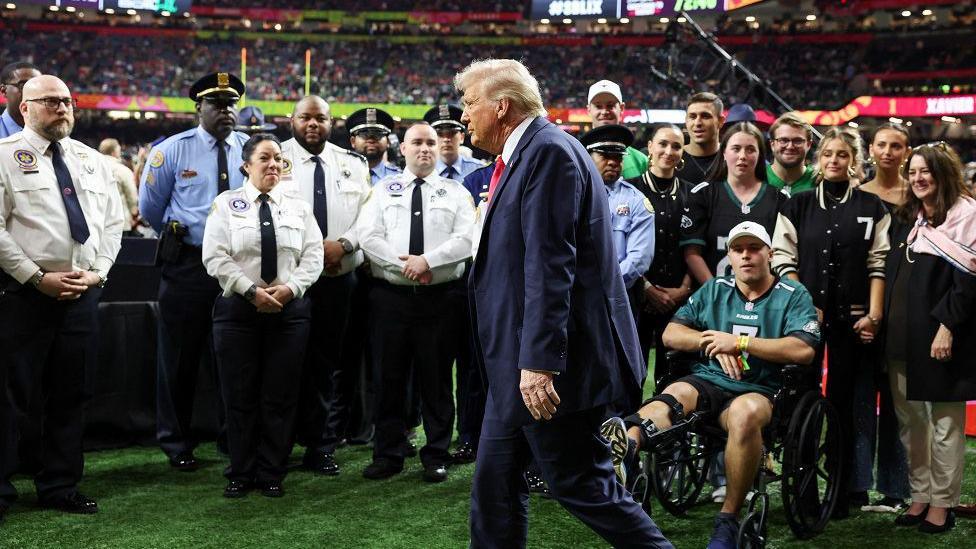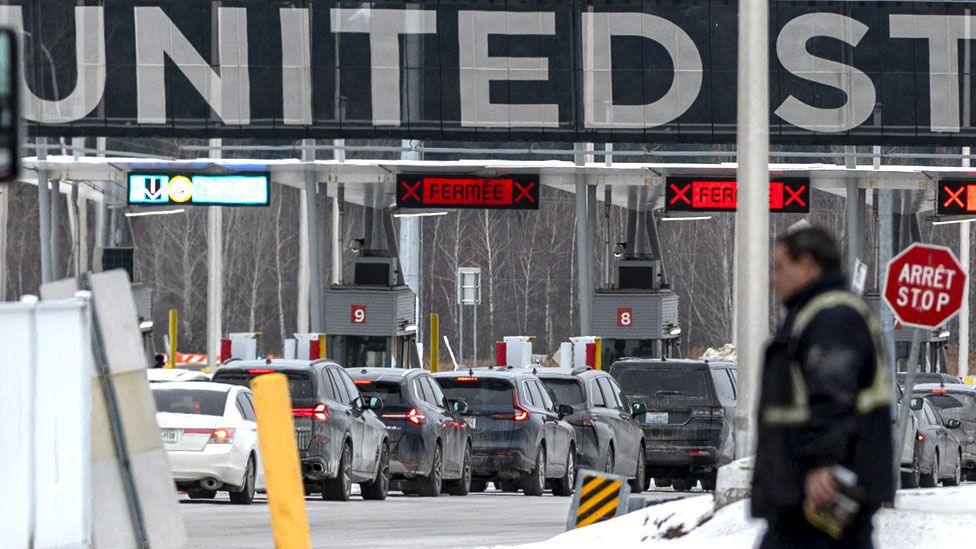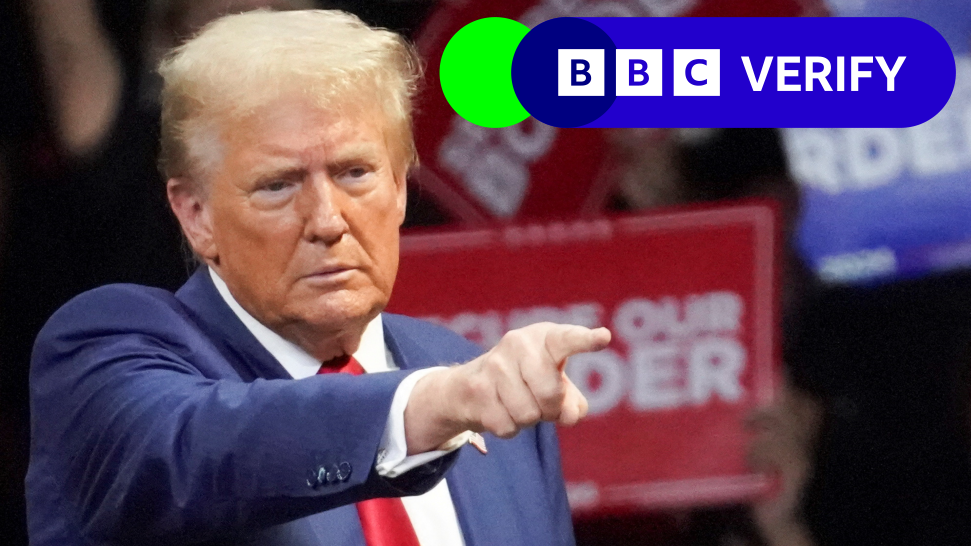Trump says tariffs coming on steel and aluminium
Any steel coming into the US will have a 25% tariff - Trump
- Published
President Donald Trump has said he will announce a 25% import tax on all steel and aluminium entering the US, a move that will have the biggest impact in Canada.
Trump also said that there would be an announcement later in the week about reciprocal tariffs on all countries that tax imports from the US, but he did not specify which nations would be targeted, or if there would be any exemptions.
"If they charge us, we charge them," Trump said.
The move marks another escalation in Trump's trade policy, which has already sparked retaliation from China.
Canada and Mexico are two of the US's biggest steel and aluminium trading partners.
The US accounts for about 10% of the UK steel industry's exports, but for some suppliers of speciality products it is much more important than that, making up a large proportion of their overall business.
Trade body UK Steel said any US tariffs would be a "devastating blow" to the UK industry.
Steel production in the US is heavily politicised. Some argue the country needs to be capable of producing enough high quality steel to supply its military in the event of a national emergency without relying on imports.
During his first term, Trump put tariffs of 25% on steel imports and 10% on aluminium imports from Canada, Mexico and the European Union.
But the US reached a deal a year later with Canada and Mexico to end those tariffs, although the EU import taxes remained in place until 2021.
Those tariffs increased costs for car firms in the US as well as makers of fizzy drinks who use aluminium in their cans. These were then passed on to consumers, according a report from thinktank Tax Foundation.
Speaking on board Air Force One, Trump said on Monday he would announce tariffs on "everybody" for steel and aluminium.
"Any steel coming into the United States is going to have a 25% tariff," he said.
In response, Doug Ford, the premier of the province of Ontario, accused Trump of "shifting goalposts and constant chaos, putting our economy at risk" in an online post. Canada's steel production is concentrated in Ontario.
Canadian political adviser Catherine Loubier said she believed Trump's threats were real, but said there could be a solution because of how connected the two economies are.
"Hundreds of thousands of jobs in the US are linked to the steel and aluminium input from Canada into the US economy," she told the BBC's Today programme.
"I think there's a lot at stake and nobody's winning with these tariffs, that's for sure."
The EU said it had not received any official notification of new tariffs from the US, but added that it saw "no justification" for any such tariffs on its exports.
"We will react to protect the interests of European businesses, workers and consumers from unjustified measures," it said.
Australian Prime Minister Anthony Albanese said he push for an exemption to the tariffs - something the country got during Trump's first term.
Trump's comments caused shares in major South Korean steel and car makers to fall. South Korea is a major exporter of steel to the US.
The price of gold - often seen as a haven for investors in difficult economic times - rose on Monday to hit a record high of $2,903.08 an ounce.

Trump took part in a meet and greet, including with family members of the victims from the New Orleans truck attack earlier this year
Tariffs are a central part of Trump's economic vision - he sees them as a way of growing the US economy, protecting jobs and raising tax revenue.
The result has been a flurry of announcements since his inauguration.
Earlier this month, Trump threatened to impose import duties of 25% on Canadian and Mexican products, but later later delayed that plan for 30 days.
He also brought in new US levies of 10% on all Chinese goods coming into the US.
Beijing retaliated with its own set of tariffs which took effect on Monday.
These included controls on imports of US coal, oil, gas, agricultural machinery, large-engine cars, and controls on exports of 25 rare metals needed for electric and military equipment.
Earlier this month, Trump said that tariffs on the EU would come "pretty soon", but suggested the UK could avoid them.
Trump has also said the US will introduce reciprocal tariffs on "Tuesday or Wednesday" on all countries that tax US imports, which will match the tariff rates levied by each country. "It'll be great for everybody, including other countries," he said.
Chinese government spokesperson Guo Jiakun said: "There are no winners in a trade war or tariff battle. What is harmed are the interests of the people of both countries."
He urged the US to "correct its erroneous approach and stop politicising and weaponising economic and trade issues".
Victor Gao, a Chinese diplomat and economist, told the BBC that China's move to put controls on rare metal exports were "in direct retaliation against the US imposition of policies denying Chinese access to semiconductor chips and many other AI developments".
"And this is truly tit-for-tat because China wants to have free trade for all of these things."
However, he added that China would not be affected too much because of US shoppers' demand for cheap Chinese goods.
"[Chinese goods] are very much affordable and competitive even with a 10% tariff," he said.
'Gulf of America'
On the trip to New Orleans, Trump also signed an proclamation designating 9 February "Gulf of America" day to celebrate his order renaming of the Gulf of Mexico, as his plane crossed the body of water.
Mexico argues the US cannot legally change the Gulf's name because UN rules dictate that an individual country's sovereign territory only extends up to 12 nautical miles out from the coastline.
Trump also repeated his unlikely suggestions that the US could take over Canada and the Gaza Strip, saying Canada would fare better as the "51st state" and that he was "committed to buying and owning Gaza".
- Published5 November

- Published1 February
